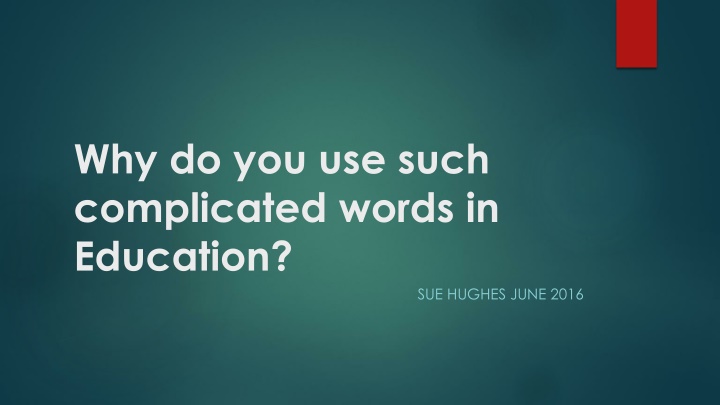
Complexities of Education: Linguistic, Cognitive, and Sociocultural Aspects
Explore the linguistic, cognitive, and sociocultural aspects of academic language in university teaching and learning. Discover how traditional discourse patterns can be transformed to facilitate students' academic progression in their subject disciplines.
Download Presentation

Please find below an Image/Link to download the presentation.
The content on the website is provided AS IS for your information and personal use only. It may not be sold, licensed, or shared on other websites without obtaining consent from the author. If you encounter any issues during the download, it is possible that the publisher has removed the file from their server.
You are allowed to download the files provided on this website for personal or commercial use, subject to the condition that they are used lawfully. All files are the property of their respective owners.
The content on the website is provided AS IS for your information and personal use only. It may not be sold, licensed, or shared on other websites without obtaining consent from the author.
E N D
Presentation Transcript
Why do you use such complicated words in Education? SUE HUGHES JUNE 2016
Aspects of teaching excellence Teaching Quality (TQ) Learning Environment (LE) Student outcomes and learning gain (SO & LG) Teaching Excellence Framework Dr Geoff Stoakes, Head of Special Projects, HEA (2016)
Language and cognitive development Vygotsky s sociocultural theory of human learning describes learning as a social process social interaction plays a fundamental role in the development of cognition. Vygotsky believed everything is learned on two levels: First, through interaction with others; then integrated into the individual s mental structure. http://www.ceebl.manchester.ac.uk/events/archive /aligningcollaborativelearning/Vygotsky.pdf
Indicative criteria for each aspect of teaching excellence TQ students intellectually challenged, actively engaged in learning and satisfied Strategic and effective approach to intellectual challenge and student engagement Courses .effective in developing all students knowledge and skills LE Leadership/teaching & learning strategy support & promote excellent teaching.. Recognition and reward of excellent teaching Mutual benefits of teaching, scholarship and research SO & LG Students knowledge, skills and career readiness are enhanced by their education All students effectively supported to achieve educational and professional goals Students get added value from their studies https://www.heacademy.ac.uk/sites/default/files/do wnloads/dr_geoff_stoakes_-_tef_.pdf
Top Ten skills valued by graduate employers: 1. Ability to work in a team structure 2. Ability to make decisions and solve problems (tie) 3. Ability to communicate verbally with people inside and outside an organization 4. Ability to plan, organize and prioritize work 5. Ability to obtain and process information 6. Ability to analyze quantitative data 7. Technical knowledge related to the job 8. Proficiency with computer software programs 9. Ability to create and/or edit written reports 10. Ability to sell and influence others
Key questions What are the linguistic, cognitive, and sociocultural aspects of academic language in university teaching and learning? How do we change traditional patterns of discourse and develop new discourses with students that facilitate their crossing of the academic threshold of their subject discipline?
https://www.ted.com/talks/melissa_marshall_talk_ner dy_to_me?language=en
there stratification stratification of language the language of the lawyer, the doctor, the businessman, the politician, the public education teacher and so forth, and these sometimes coincide with, and sometimes depart from, the stratification into genres. it goes without saying that these languages differ from each other not only in their vocabularies; they involve specific forms for manifesting intentions, forms for making conceptualization and evaluation concrete. is interwoven of with this professional generic language a The Dialogic Imagination, Mikhail Bakhtin http://www.public.iastate.edu/~carlos/607/readings/bakhtin.pdf
Pedagogy, cognition, differentiation, constructivism, behaviourism, oracy, sociocultural, zone of proximal development Assess, ability, analyse, evaluate, reflect, explain, process, justify, policy, record, compare, teach, scaffold, learn Write, look, listen, tables, chairs, board, classroom, teacher, pupil, playground
What words/phrases are in your language pyramid?
How do we teach students these skills: Compare Contrast Evaluate to examine the similarities and differences; emphasizing similarities to examine the differences to judge the reasonableness and quality of ideas Explain Infer to respond to questions; to give one s viewpoint to defend a viewpoint to arrive (figure out/guess) at a conclusion after analyzing the facts Tier 2 Vocabulary Words for High School
Planning the journey and giving time and thought as to how best to get there!
Explore what it is Compare, contrast, analyse Create, evaluate Pedagogy Pedagogical theories and practices Personal action theory, critically reflective practice and writing about Pedagogy The progression of language acquisition and development within a module/programme
Graphic organisers for comprehension and composition Descriptive or semantic map Network tree Spider map Cause and effect Compare and contrast map Compare / contrast matrix. Series of events chain Cycle map Venn diagram Timeline Decision tree http://www.eajournals.org/wp-content/uploads/The- Effect-of-Using-Graphic-Organizers-on-Writing.pdf
Exploring the potential of role play in higher education: development of a typology and teacher guidelines Deepa Raoa and Ieva Stupans* Innovations in Education and Teaching International Vol. 49, No. 4, November 2012, 427 436 See also Mantle of the Expert http://www.kcl.ac.uk/study/learningteaching/kli/rese arch/hern/hern-j4/alison-stenton-hernjvol4.pdf
What are you taking from this workshop Implications for practice Vocabulary mapping Language progression Bloom s taxonomy Learning journey Dialogic teaching Collaborative group work Graphic organisers
